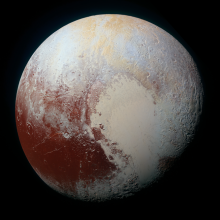I was asked this question as feedback to the site, though it wasn't directed at any particular article.
I've seen a few variations of this theme, sometimes involving a story of a public school teacher unconstitutionally pushing atheism on a theistic student, who then retorts with a stellar argument of "Can you prove you have a brain? Have you seen it?"
In a way, I like the question. There's a lot of ways it can be examined, that can lead to some good questions and discussions about epistemology.
That said, questions like these only appear in the context of religion. When is the last time you heard someone ask something like, "How do you know Pluto isn't hollow? Have been there and dug a hole?". There's more to epistemology than meets the eye.
First, let's clear up a couple misconceptions.
- Atheists don't require absolute certainty. It's enough that something can be demonstrated "beyond a reasonable doubt". Outside of math, "proofs" or "proving" is just a reference to this idea of sufficiently making your case.
- Atheists don't "only believe what they can see" - this is a common mischaracterization in the media. We want sufficient empirical evidence that can justify an assertion. We've never seen the nucleus of an atom, but we have plenty of evidence they exist.[1]
You scoffed when I asked about Pluto's hollowness. It was clearly audible.
Most people accept that the planets (or dwarf planets, in this case) aren't hollow. This isn't challenged... but how do we know? There's a number of factors that help us.
Prior precedent - we have examined the Earth and the moon. They aren't hollow. Occam's razor would hold that the other celestial bodies largely operate in similar ways.
Physics - a number of aspects of physics would have to fly out of the window for Pluto to be hollow.
- Pluto's gravity would be different, affecting the orbits of nearby objects.
- Or, its entire mass would be concentrated in its shell, creating densities that are unaccountable for the materials, which we can determine through astronomical spectroscopy.
- Or, spectroscopy, which we can thoroughly test here on Earth, suddenly doesn't work anymore, with respect to Pluto.
- Or, aliens - who either evolved on a planet that would violate laws abiogenesis and biology, or who broke laws of physics to visit this system from another - established a hollow Pluto.
It's not that these things cannot be true.. it's just that, without further evidence, there's no reason to grant them any credibility.
Proposing that Pluto may not be hollow does't exist in a vacuum. Suddenly, entire fields of study start collapsing, and absurdities flourish, when we have an exceptionally simply answer that accounts for all the data.
Nature is consistent. Pluto isn't hollow - as a high-confidence conclusion that is acceptable beyond a reasonable doubt.
What does this have to do with my having a brain? It's basically the same conversation.
- We have prior precedent for brains.
- Whenever we have looked in a skull of a functional human, they've had a functional brain.
(Imagine the headlines if brain surgeons opened up a skull for an otherwise normal person, and found no brain!) - We've done thorough investigations of what the brain has to do with living humans. We have technology like MRIs or EEGs[2] that we can test what's doing what.
- The only humans with non-functional brains have been dead, or on artificial life support.
If I didn't have a brain, neurology, biology and chemistry would all plummet into disarray as so many fundamental observations and knowledge of reality is suddenly false. Without taking even so much as a peep inside my skull, the possibility of me not having some kind of brain is essentially zilch, from an epistemic standpoint.
So yes, beyond a reasonable doubt, I have a brain.
As I pointed out earlier... these kinds of "epistemic crises" only ever appear in religious debates. No one is storming around the house seriously demanding to know whether his/her cat or dog actually has a brain. It's accepted as common sense, and is likely to earn this person some strange looks.
This question is asked as some kind of rhetorical "gotchya" point - just because we can't see God, doesn't mean he doesn't exist.
I would have granted that up front. However - If only the God assertion was even in the same ballpark, in terms of investigation.
- Unlike brains, we have zero prior precedent for any gods.
- The non-existence of gods doesn't violate any well-researched fields.
- The existence of brainless minds that exist outside of space and time, that somehow can create (or violate) even the laws of physics themselves - does violate well-research fields of study.
Equating the question of a functional human having a brain - with a God existing - is like believing the statements "I own a cat" and "I own a black-hole powered, interdimensional time-travelling ship that's bigger on the inside than the outside" are somehow of equal standing.
They're not.

